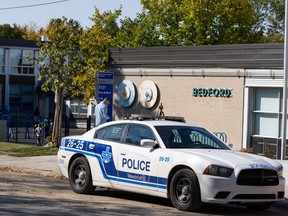Paul St-Pierre Plamondon says the education minister only referred to “ideological divergences” in a Radio-Canada interview, without acknowledging the religious part of the equation.

Article content
QUEBEC — Urging politicians to not shy away from the debate because it involves religion, Parti Québécois Leader Paul St-Pierre Plamondon called Monday for stricter secularism rules in the wake of the Bedford school controversy.
St-Pierre Plamondon said what happened in the French elementary school illustrates that the “current law and current mechanisms,” including Bill 21 on state secularism, that are designed to keep religion out of public schools are not working or not being applied correctly.
Advertisement 2
Story continues below
Article content
The absence of a mix of students in Montreal’s schools and the fact many are not born in Quebec has also led to a few cultural communities or religious communities assuming a majority position, he added at a news conference.
“The danger isn’t only in Quebec,” St-Pierre Plamondon told reporters. “You can see this all over the western world. So we need to study how we can get a mix so no microcosms form. That’s a bit what happened at Bedford. The law is insufficient.”
But he said the correction process starts with the government not being afraid to identify the problem at Bedford, which he said amounts to “religious and ideological entryism” into the system.
He said Education Minister Bernard Drainville specifically did not say that in his comments Sunday evening when he was interviewed on the Radio-Canada program, Tout le monde en parle.
Drainville appeared on the show a day after the Centre de services scolaire de Montréal suspended 11 teachers at the school where a recent government report found a “toxic” climate has taken root.
St-Pierre Plamondon said Drainville only referred to “ideological divergences,” without acknowledging the religious part of the equation.
Article content
Advertisement 3
Story continues below
Article content
“You can’t find solutions to a problem that you can’t even name because you’re scared,” St-Pierre Plamondon said. “And this has nothing to do with Muslim Quebecers being different than Christian or Quebecers who don’t believe in God, really.
“Those teachers who opposed the religion entering the school were from Maghreb, and they were loyal to the law and to the program, and we let them down.”
The education ministry report released last week detailed how a “dominant clan” of teachers had imposed strict rules on students and had intimidated and ostracized anyone who opposed them.
It found children at the school were subjected to physical and psychological violence, and teachers refused to teach or paid little attention to such subjects as oral communication, science, religion and sex education.
It also noted some teachers believed learning difficulties and autism didn’t exist and that excessive discipline and control would work to “break” some students and get them “back on the right path.”
The report revealed that a quick succession of school directors came and went during that period. The vast majority of students at the school were allophone; only about 20 per cent spoke French at home.
Advertisement 4
Story continues below
Article content
The report described the group of problematic teachers as being of North African descent, some of whom attended a local mosque together.
It says a representative of the mosque met one year with the school’s administration, explaining “the importance of having good relations with the Muslims of the neighbourhood and of the school.” Witnesses told the government investigators that the local Muslim community carried a “strong influence” on several of the school’s staff members.
However, the report mentioned that there were staff members of North African descent who opposed the way the “dominant clan” was acting.
St-Pierre Plamondon ventured a theory to explain why teachers, school and service centre officials plus the government itself allowed the situation at the school to drag on for years: the fear of being accused of being racist.
“I know from experience that as soon as you name laicity of one of the principles of Quebec society, there’s a good chance you will be labelled racist,” St-Pierre Plamondon said.
“There is an anti-Bill 21 movement out there that is very aggressive, and this explains the fear everyone had of acting in this situation.”
St-Pierre Plamondon said the PQ intends to spend the week ahead at the Legislature pushing for better secularism rules.
He outlined a list of actions that can be taken, including banning any form of partnerships between schools and religious institutions. Bill 21 should be amended so that religious building such as churches and temples no longer be tagged community centres.
Quebec should put an end to its funding of religious schools, he said, noting there are 50 schools in Quebec benefiting from $160 million a year in aid. He said that money could be poured into the public system.
X.com/philipauthier
Recommended from Editorial
Advertisement 5
Story continues below
Article content
Article content

Comments